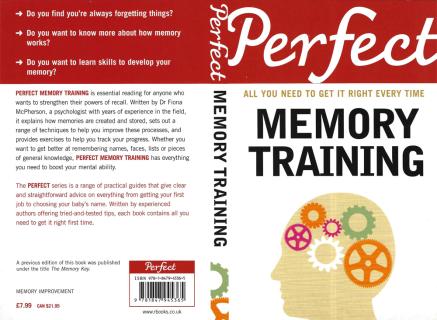Most memory improvement courses do not result in long-lasting change. A major reason for this is that, although the courses usually teach effective strategies, they fail to adequately instruct the participants when and when not to use them. The memory situations that you experience in your daily life cannot be precisely defined. You cannot make a list of the situations in which a particular strategy is effective. The effectiveness of a memory strategy depends on a number of different factors — not simply the task itself, but also many factors relating to the context of the task, and your own individual circumstances (personality, mood, physical state, etc.). To know when and when not to apply a particular strategy, you need to understand why and how it works. You cannot do this without having a basic understanding of how memory works.
An effective rememberer
- knows how memory works
- has many memory skills and can apply them appropriately
- accurately judges how well they have learned, and how likely they are to remember easily and accurately
The first part of this book sets out to describe the basic principles of memory. A great deal is now known about memory — I have tried to select only those bits that the reader needs to know, to understand why and how and when memory strategies work. I have tried to integrate the useful information so that the reader can see how it all fits together. I believe strongly that if it is not clearly evident how the various principles (general) and rules (specific) relate to each other, then the information will not be understood. And if it is not understood, it will not be remembered.
An important part of improving your memory involves understanding that there are different memory domains — different “memories”, if you like, that are concerned with different types of information. Thus there is a memory domain that deals with remembering people’s faces, and one that remembers how to drive a car, and one that remembers that you need to stop at the shop on the way home. To appropriately apply memory strategies, you need to know which memory domain is involved and understand the differences between these different domains. A chapter is devoted to discussing the different memory domains.
In the last section of the book I look at various effective memory strategies and explain how they work in terms of the basic principles. After reading this, the reader should not only understand when particular strategies are appropriate, but should also be in a much better position to judge the value of the various bits of advice given on how to improve your memory.
Publication date: 2009
Number of pages: 193
ISBN: 9781847945365
Part 1: How memory works
1: Making memories
How memories are created
2: Finding memories
How memories are retrieved
3: Making memories that will be easy to find
Making strong links
Improving memory codes
4: Choosing what to remember
Aim for the distinctive
Memorising versus learning
Paying attention
5: Different parts of memory
Knowledge memory
Personal memory
6: The memory you work with
Using your working memory
Differences between working memory and the database
Measuring your working memory capacity
Expanding your working memory capacity
Part 2: Strategies
7: Using your memory
Why do you want to improve your memory?
The cost of memory skills
Be confident
8: Strategies to improve your learning
Understand, select and attend
Active reading
Taking notes
Building on the given information
Choosing the right study strategy
9: Mnemonics — some memory ‘tricks’
Imagery mnemonics
Verbal mnemonics
When should you use mnemonics?
Choosing the right mnemonic
10: Improving your attention
Set yourself goals
Manage your time
Monitor your progress
Control your environment
Control yourself
12: Think strategically
Match the task to a strategy
Become a strategic thinker
Put it into practice
Balancing cost with reward
Choose what to remember
Quick reference section
Tests of working memory capacity
Digit span
Word span
Reading span
Glossary
Recommended reading
Answers to exercises
Index

